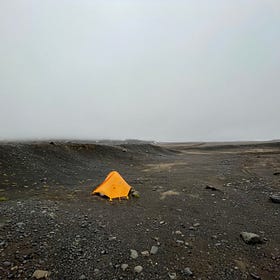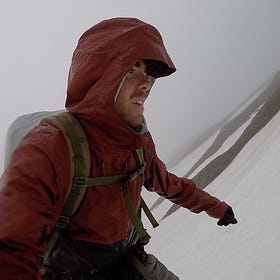I've mistaken this place for a dream in my memory. Barefoot, my pack sank me deeper into the igneous sand. And the only sounds besides the tide were birds reeling from their first human encounter. There may as well have been no one else walking the earth, the way I felt on this beach: sequestered from reality. There were rocks, pebbles, and grains of sand. And, in the distance, Snæfellsjökull. An eon in my eye and millennia between my toes.
There is nothing more noble in Nature than a glacier. What could possibly be "of higher birth" than a body formed of the fallen fruits of heaven? Trillions of icy angels compose these bodies that are both immovable and unstoppable. They strut through the hallways of Earth, and where there are none, they strut anyway at the same unyielding pace. Perched atop that mountain in a stone throne… what monarch is also a mason? These icy rivers are humble rulers, skilled craftsman, and model parents. The paternal surface of the glacier is rigid, crystalline, rough; and the maternal depths are chaotic, transformative, in flux — the womb of new space. Their children are Earth's most majestic features: waterfalls, fingerling fjords, horned peaks, haunting moraines, alpine lakes, and snow-filled cirques. Trillions of icy angels conspire to make the earth more divine.
We say that we fear for them, that they might all melt away. But in truth, we fear for ourselves. "The glaciers are dead, and we have killed them." We fear who we must become to appear worthy of such a crime. We fear not the death of Nature's monarchs but the consequences we would reap for melting these rarified bodies. We fear intemperate temperatures and the floods that would pour out of the dense ice. We speak as if the Earth needs us to save it, but we are saving ourselves from it. We cannot scratch the planet and certainly can't kill it. Just as the glaciers have preceded us, they will succeed us. Even if we fulfill this murder of all murders, the glaciers will reign again. We could survive for another million years before going extinct, and our flimsy cities could become ruins, then rubble, then dust. And the Earth will have only blinked. The glaciers will never die; they will simply wait for a time when the earth, once again, is ready to be brought closer to the divine.
From this beach, I stared at the snow-capped peak, as I stepped over a shoot of its many snow-melt streams. I stared at the glacier that had once carved this valley and has since fed the sea. What valleys will I carve? Or is that too grand a feat for a bipedal mammal like me?
Springboard
A carefully crafted question to help you dive inwards:
Are we "saving the planet" or merely saving ourselves from the karmic wrath of our planet? And would conservation be any less noble a pursuit if our motive was revealed to be self-preservation rather than altruism?
This piece doubles as a way to get me back in the mood for my Iceland series, “Feeling Fire and Ice.” This a project I’m still excited about and one I plan to finish before the end of the year. I want to publish version 1 of the main five chapters here on The Intronaut and then compile them into a hybrid of an essay collection and an adventure memoir, as a self-published book.
Each part of “Feeling Fire and Ice” focuses on a different duality — how to find harmony among two extremes. I’ve already published “Hubris and Humility” and “Majesty and Mortality.” And I’m curious: Which of the upcoming chapters sounds most interesting to you?
Thank you for reading,
Hubris and Humility
There's nothing more humbling then realizing you don't know how to shit. Am I a fully functioning adult capable of navigating the Icelandic wilderness? Or am I merely a waddling toddler who needs to be told where to place his doo-doo?
Majesty and Mortality
In Iceland, there's a saying: "If you don't like the weather, wait five minutes." It's a joke about the nation's harsh, volatile climate, and it's a profession of faith. Even when you're caught in sideways rain and are miles from shelter, you can find comfort in the idea that the weather might get better in just five minutes. And that's true; it might.








Beautiful